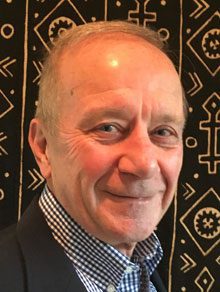 “By whom or by what had I been impelled to disrupt the normal course of my existence?” the globe-trotting French anthropologist Clause Lévi-Strauss asked in his 1955 memoir, Tristes Tropiques. I asked myself the same question every few days over a ten-month period in the mid-1970s when I was trekking around a small chunk of West Africa, cassette recorder in hand, seeking professional story-tellers (generically, griots) and village elders to recite what they knew of family, village, or state history.
“By whom or by what had I been impelled to disrupt the normal course of my existence?” the globe-trotting French anthropologist Clause Lévi-Strauss asked in his 1955 memoir, Tristes Tropiques. I asked myself the same question every few days over a ten-month period in the mid-1970s when I was trekking around a small chunk of West Africa, cassette recorder in hand, seeking professional story-tellers (generically, griots) and village elders to recite what they knew of family, village, or state history.
My intention was to use the information for a study of a small, Gambia-River slave-trading state that existed for half a millennium before the British took over in 1893 and put it out of existence. This isn’t the place to go into how I got involved in studying African history; the truth doesn’t put me in a grand light, anyway. I did what I intended in Africa, got my degree, and had a full-enough career afterwards.
Leaving The Gambia when I’d finished my work, now forty-five years ago, was an experience full of emotion, none more poignant than my last encounter with an African friend. I had always exercised and, with heart disease thinning out both sides of my family, had early bought into ideas about how aerobic exercise could improve one’s cardiovascular health. I, thus, came to The Gambia in August 1974 “a runner.” But I had never run in the same heat and humidity that I encountered in rainy-season West Africa. T-shirts I washed, wrung out by hand, and hung on a line to dry were still damp a week later. And the insects! At night, when I sat below an exposed bulb, writing air letters to my parents with my K-Mart typewriter, I rolled up mosquitoes in the platen when I threw the carriage to start a new line. (I still have the letters, which still hold the squashed critters.) Also, I wasn’t comfortable heading out in public wearing shorts and sneakers (never mind the Cleveland Browns t-shirt) in this Muslim society where men wore long gowns and women were not to show arms and legs. But around the first of November, when the rains ended and the humidity broke, foreshadowing months with dry winds off the Sahara, I sucked it up and went running. It was on one of those early runs that I met a new friend.
I didn’t need to run through the heart of town, since my flat was at one end of a sandspit where a raised road, constructed to control flooding, headed through the marsh and out of town. My first couple of runs were uneventful, but on about the third one, as I was returning past a squat building that housed a pump, a Gambian man suddenly appeared in front of me as if he’d popped up out of a ditch. He was maybe fifty years old, had the ubiquitous stocking cap on his head and was wearing a knee-length, tan gown that reminded me of a maternity dress. In his left hand he carried a bucket. As I approached, not judging him unfriendly, I stuck out my hand to shake; he offered his calloused hand and a toothless smile, making what I took to be pantomime gestures of my running; I grinned, nodded, waved, and ran on.
From then on, when I ran the road and approached the building, he would often be in eyesight and come scurrying up to shake my hand. This probably happened thirty or forty times over five months. We shared no common language, so never spoke an intelligible word between us. He always wore what appeared to be the same clothing (as did I, come to think of it). I never knew what he used his bucket for—my guess was he either collected oysters off the roots of the mangroves that lined the road (though he never had any in the bucket) or was involved in keeping the pump in operation. We just shook, nodded, grinned, waved, and enjoyed a cross-cultural friendship that didn’t require speech.
A day before my departure from Gambia, my work done and bags packed, I took a final run and, as usual, on my way back my pal appeared. After we shook hands, I did my best to convey that I wouldn’t be out that way again. A British Caledonian 707 had just taken off from the national airport and was flying low overhead on it’s way to London, so I pointed to the plane, then to myself, held out my arms as wings, mugged a sad expression, and waved good-bye. He nodded, looking equally sad, bowed at the waist, and that was the last time I would ever see him.
I have often asked myself how a person can be so fond of another about whom he knows so little. But that’s the way it was with me and that part of the world. I developed the deepest fondness for the place, but there was always a level of knowledge about it that I knew I wouldn’t be able to crack.
I still haven’t, but sometiames I act as if I have. And I press on.






